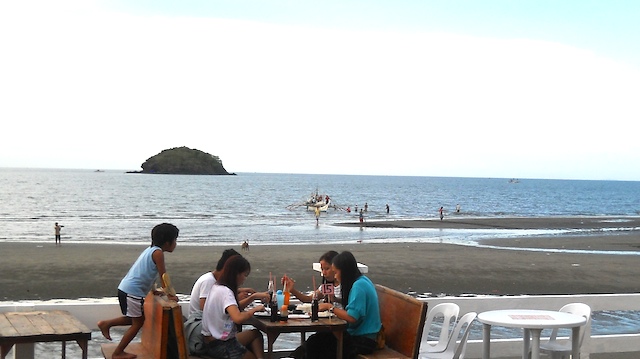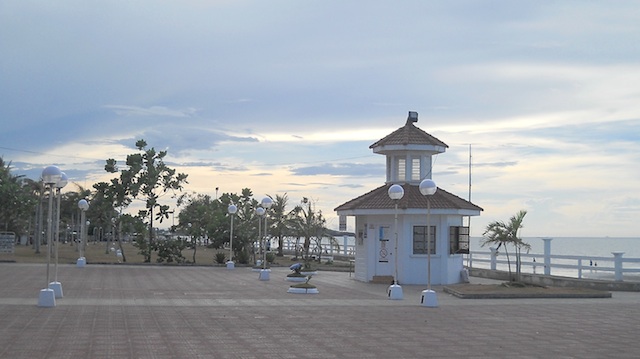Seafood trip in Roxas City
At 4:30 in the afternoon, the sea was calm and the sky was overcast, so it was not so hot anymore. I felt refreshed just looking at the water and the familiar islet named after the severed ear of a giant whose body exploded and became islands scattered around the Sibuyan Sea, according to a Capiznon legend.
I was tired and famished after a one and a half-hour boat ride from Bacolod, followed by a 3-hour bus trip from Iloilo City. Upon arriving in sleepy Roxas City in Capiz for a research project, I dropped my bags at the hotel and hailed a tricycle for the ten-minute drive to Baybay (literally, “seashore”) district, where the seafood restaurants are found.
Too bad I was wearing rubber shoes, because when I arrived at the People’s Park Plaza, I saw lots of people swimming in the sea. It was a Saturday and the last week of April, the cruelest month of the year. I was glad to have escaped the oppressive heat of Metro Manila, and literally had to stop myself from running to the sea because I couldn’t afford to get my shoes wet, as those were the only ones I had brought on this trip.
Instead I went to the Seafood Court, a big hall with tables and chairs and stalls displaying a wide variety of seashells and fish that the locals will cook for you. Roxas City certainly deserves its moniker as “the Seafood Capital of the Philippines” and I was soon ordering talaba, sinigang na mangagat (red snapper), a couple of lukos or squid, two cups of rice, a bottle of Mirinda, and bottled water for a little over 300 pesos. Here it is best to eat talaba that is malasado or half-cooked, because it is guaranteed to be freshly harvested. The flesh simply melts on your tongue, giving you a taste of all the romantic, sensual, and exotic promises of the sea. The sinigang reminded me of my childhood in Maybato, Antique – also in Panay island – where the fish we ate in summer was always fresh. The squid was stuffed with generous slices of onion and yellow tomatoes, then grilled to a perfect golden yellow. Its sweetness spreads from the tongue until it fills your mouth, and down your throat until it reaches your heart, making you happy and contented.
Here it is best to eat talaba that is malasado or half-cooked, because it is guaranteed to be freshly harvested. The flesh simply melts on your tongue, giving you a taste of all the romantic, sensual, and exotic promises of the sea. The sinigang reminded me of my childhood in Maybato, Antique – also in Panay island – where the fish we ate in summer was always fresh. The squid was stuffed with generous slices of onion and yellow tomatoes, then grilled to a perfect golden yellow. Its sweetness spreads from the tongue until it fills your mouth, and down your throat until it reaches your heart, making you happy and contented.
It was a lazy, and somewhat gluttony, afternoon. While waiting for the sunset, I watched the children playing patintero at the beach. The innocence in their laughter almost surprised me. Why don’t I laugh that way anymore?
Although it was nearly dusk, there were still people swimming in the sea. A pumpboat was lazing by the seashore, and teenage boys raked the sand for seashells called kagaykay, a surf clam that makes a flavorful broth. When the sun had finally set, I promised to come back early the next day to swim and to eat my favorite grilled squid again.
The following day I woke up at 5:00 AM, and after my first cup of coffee and some scribbling in my journal, I was off to Baybay again. Roxas City was still sleeping, except for those who went to Sunday mass. There were some joggers at the park, but because it was still early, no one was swimming in the calm sea. I went to the beach, dropped my bag on the sand, and abandoned my slippers. At last I was swimming in the sea again. I was in my element, and I was very happy.
As I lay floating, I remembered a generous soul who brought me to Mantalinga Islet on his speed boat five years ago. He had his men bring a table and chairs, and food for a lunch picnic. While sunning ourselves in a natural bathtub that the sea had sculpted among the rocks, he told me the story of the giant whose body parts became islets and islands. He laughingly pointed out that we were relaxing inside the giant’s ear, or talinga in Hiligaynon, the singsong language that the city shares with Iloilo and Bacolod.
At around 8:00 AM, friends and families started arriving for their picnics. The sun was getting a bit too much for my skin, and I decided it was time for breakfast. Before going to the Seafood Court, I picked up some shells locally called torotot because they resemble the pointy horns used during New Year’s Eve. A dozen or so of these auger shells, slender and long with acute spires and many whorls and spirally corded, would be brought back to Pasig for my aquarium.
The woman in the seafood stall was surprised, but was happy to see me again. I ordered the same seafood dishes and asked for a discount, telling her I am already a suki. She laughed, and her laughter sounded like gentle sea waves. – YA, GMA News
J. I. E. Teodoro is a Palanca award-winning writer from San Jose de Buenavista, Antique. He is currently an assistant professor of writing and literature at Miriam College in Quezon City. Read his blogs at www.jieteodoro.blogspot.com and www.literaturanghiligaynon.blogspot.com.




